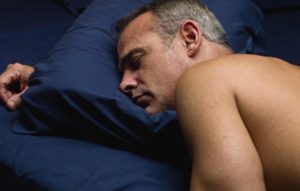
For many people who snore heavily or have sleep apnea, an oft-prescribed remedy is a C-PAP device. Although effective and deemed the “industry gold standard” for restoring restful sleep, these devices are so encumbering that consistent use is not always the norm.
Obstructive sleep apnea (OSA) occurs when the soft tissues of the mouth and airway, including the tongue, obstruct oxygen flow into airways passages. This causes breathing to pause multiple times throughout the night, sometimes for up to a minute each time. This can occur hundreds of times throughout the night. Heavy snoring is often a precursor to sleep apnea.
When oxygen levels in the body fall while sleeping, research has shown this can lead to significantly higher risks for cardiovascular disease, stroke, memory loss, depression, obesity, and other serious health problems.
CPAP, an acronym for Continuous Positive Airway Pressure, works by pushing air into the back of the throat where throat tissues commonly collapse during sleep. This helps to open the airway so inhaling and exhaling of air can occur during sleep. The device is made up of a mask that is worn over the face. A hose is attached to the mask and connected to a fan that forces air through the hose. While more modernized versions of the device exist, most follow this basic premise.
One study, published by the Journal of Otolaryngology – Head & Neck Surgery, tracked CPAP users over a 20 year period. The results showed over 34 percent of users failed to comply with consistent use:
“The overall CPAP non-adherence rate based on a 7 hour per night sleep time that was reported in studies conducted over the twenty year time frame was 34.1 %. There was no significant improvement over the time frame.” (https://www.ncbi.nlm.nih.gov/pmc/articles/PMC4992257/)
Typical symptoms and early indications of sleep apnea are daytime fatigue, nodding off easily during the day, being more accident prone, feeling less alert and less energetic. For sleep apnea sufferers, a study by AAA shared that sleep deprived drivers were more dangerous than drunk drivers.
Research has also shown that the brain relies on the nightly period of restful sleep. During this time, brain functions are optimized and reset so it can serve more efficiently in its role as central control system to other areas of the body.
Obviously, your health and safety needs full sleep each night. Yet, if you can’t get comfortable with a CPAP device, non-compliance can be just as harmful as not having one at all. An alternative, for many who struggle with mild to moderate levels of OSA, is an oral sleep appliance.
Often custom-made devices are offered by dentists who are trained to provide a particular type. Most are FDA approved and effective in opening up the airways to allow for sufficient oxygen intake during sleep. However, like many things, these are not always as effective when it comes to one dentist or another.
The difference doesn’t simply rely on the variations from one oral appliance system to another. It takes unique training to truly understand the integral makeup of airway passages and the structures that interfere with breathing, especially during sleep. For example, the custom fit is very different when a patient is not fully reclined and relaxed. Simply being fitted while in a dentist’s treatment chair doesn’t necessarily provide the ‘true’ position for creating an oral device that effectively overcomes breathing obstructions during actual sleep.
I have been heavily involved in advanced training that enables me to utilize the information gleaned from sleep studies and apply it to the specific needs of OSA patients and those who snore heavily. Thus far in 2018, I’ve also completed over 45 additional hours of training along these lines so our sleep appliance patients receive what is truly an effective outcome with devices that are individually contoured for optimal comfort.
In addition to utilizing advanced technology and diagnostic equipment, my latest training covered:
• New methods to assess the intricate interaction between head/neck muscles, upper and lower teeth (the ‘bite’), bone structures and jaw joints.
• Finding the true ‘relaxed’ position of the bite and jaw joints for an accurate diagnosis.
• New testing methods; assessing test results accurately.
• Integrating posture assessment in diagnosis.
• New findings between the relationship between TMJ Disorders and Sleep Apnea.
• Advancements in understanding trigger points and trauma.
• Advancements in treating inflammation of the jaw joint(s).
• New developments in treatment using oral appliances and physical therapy.
While I’m excited about the latest advancements in this area, our patients are the best testaments to our exceptional process: “From day one, I felt like a new man. My energy returned, I became active again and I’ve lost weight.” – Steve M.
For people who have had a sleep study, we suggest a consultation appointment in our office to learn the process for developing a device that will work best for you. There is no charge for this appointment. We can also discuss estimated costs, possible insurance coverage, treatment time, and payment plans.
If you have not yet had a sleep study, we can make recommendations so you are aware of the level of sleep apnea you have, and especially, if you have the disorder at all.
Begin by calling 586-739-2155 or tap here to schedule your free consult.